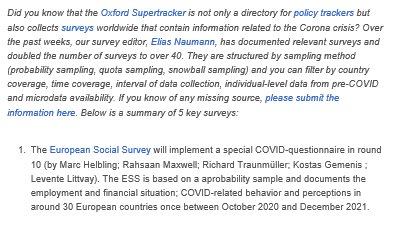
Yesterday, I presented on the #COVID19 employment crisis and trade union involvement in tackling the effects at the @ETUI_org to participants from Spain (@UGT_Comunica), Italy (@CislNazionale) & Slovenia(@z_s_s_s). Thanks for the invitation @ValericadD!
My key points 1/..
My key points 1/..

Employment composition matters for vulnerability to the #COVID19 crisis.
Countries with a higher share of jobs concentrated in industries stronger affected and with a higher share of non-standard employment are generally more vulnerable. oecd.org/economic-outlo…
Countries with a higher share of jobs concentrated in industries stronger affected and with a higher share of non-standard employment are generally more vulnerable. oecd.org/economic-outlo…

Employment is affected unevenly across occupations & the wage distribution.
Many low-wage jobs suffer from the negative employment shock, as @RMaria_drc @AnToniPichler et al estimate based on US data. Many positive affected jobs face high infection risks
academic.oup.com/oxrep/article/…
Many low-wage jobs suffer from the negative employment shock, as @RMaria_drc @AnToniPichler et al estimate based on US data. Many positive affected jobs face high infection risks
academic.oup.com/oxrep/article/…

In previous recessions, bankruptcies & unemployment kept rising for longer. The #COVID19 crisis is different and over the summer we have seen an indication of how quickly recovery may happen. However, with the 2nd wave rolling over Europe, much of the economic strain is to come. 

Short-term work schemes played a key role in preserving employment, though design matters and large differences in effectiveness remain across Europe and even more so between Europe and the US, as @AnkeHassel & Thelen have summarised.
washingtonpost.com/politics/2020/…
washingtonpost.com/politics/2020/…

. @andysalvatori et al at @OECD_Social provide a more detailed analysis of job retention schemes in response to the #COVID19 crisis.
Across the OECD, they supported over 50 million jobs, ten times as many as during the GFC 2008/09.
oecd.org/coronavirus/po…
Across the OECD, they supported over 50 million jobs, ten times as many as during the GFC 2008/09.
oecd.org/coronavirus/po…
. @tamesberger @matschnetzer @SimonTheurl have summarised what it needs to establish a successful short-time work scheme based on the Austrian experience.
voxeu.org/article/mitiga…
voxeu.org/article/mitiga…
How are crisis policies implemented?
Social dialogue experienced an impressive revival. Over 70% of countries worldwide (even 80% in Europe) relied on peak-level social dialogue, mostly tripartite, as part of their response.
Looking forward to @Ari_Tassinari's analysis.
Social dialogue experienced an impressive revival. Over 70% of countries worldwide (even 80% in Europe) relied on peak-level social dialogue, mostly tripartite, as part of their response.
Looking forward to @Ari_Tassinari's analysis.

However, over ¾ of agreements reached took place in ad hoc meetings outside of existing formal structures for social dialogue.
Further analysis on Crisis Corporatism is forthcoming by @B_Ebbinghaus et al: mzes.uni-mannheim.de/d7/en/projects…
Further analysis on Crisis Corporatism is forthcoming by @B_Ebbinghaus et al: mzes.uni-mannheim.de/d7/en/projects…
What is social dialogue used for?
In Europe, social partners are often involved in job retention, income protection (beyond STW), workplace safety measures. By contrast, social partners are less involved in supporting businesses (beyond STW) and for general social security.
In Europe, social partners are often involved in job retention, income protection (beyond STW), workplace safety measures. By contrast, social partners are less involved in supporting businesses (beyond STW) and for general social security.

• • •
Missing some Tweet in this thread? You can try to
force a refresh





